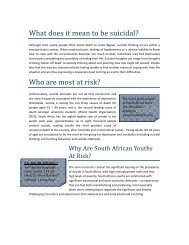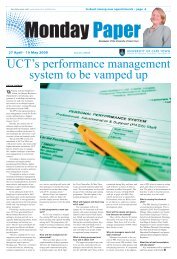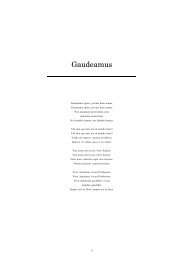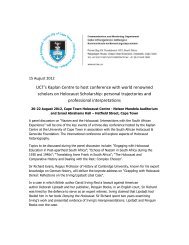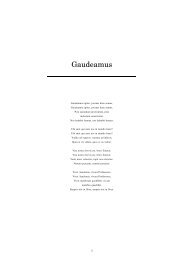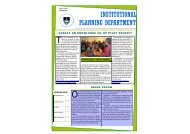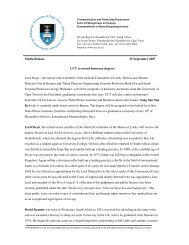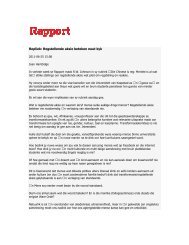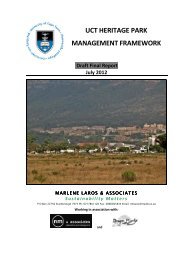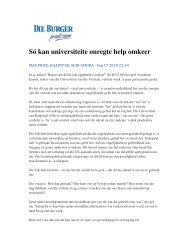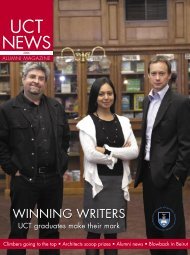Humanities 1:Layout 2 - University of Cape Town
Humanities 1:Layout 2 - University of Cape Town
Humanities 1:Layout 2 - University of Cape Town
Create successful ePaper yourself
Turn your PDF publications into a flip-book with our unique Google optimized e-Paper software.
In Film Studies:<br />
*Kristin Diane Pichaske<br />
Thesis Title: Colour adjustment: race and<br />
representation in Post-Apartheid South<br />
African documentary<br />
Kristin Pichaske holds a Masters Degree in<br />
Documentary Film and Video from Stanford<br />
<strong>University</strong>. Before relocating to South Africa<br />
on a Fullbright Fellowship in 2004, Kristin<br />
produced documentaries for Lucasfilm/Paramount<br />
Pictures. Her work has been honoured<br />
by the National Academy <strong>of</strong> Television Arts<br />
and Sciences, the National Federation <strong>of</strong><br />
Press Women and numerous film festivals.<br />
She is currently an Assistant Pr<strong>of</strong>essor in the<br />
television department <strong>of</strong> Columbia College,<br />
Chicago.<br />
The goal <strong>of</strong> this dissertation was to<br />
examine the process <strong>of</strong> racial transformation<br />
within South Africa’s documentary film industry<br />
and to assess how the nation’s shifting<br />
identity is both influenced by and<br />
reflected in documentary film. Drawing examples<br />
from a diverse collection <strong>of</strong> local and<br />
international films, Kristin examined<br />
changes in who is making documentaries in<br />
South Africa and how, as well as the representations<br />
<strong>of</strong> race that result. In particular,<br />
she focused on how the balance <strong>of</strong> insider vs.<br />
outsider storytelling may be shifting and to<br />
what effect. At the same time, Kristin qualitatively<br />
examined the representations produced<br />
by black/insider filmmakers as<br />
compared to those <strong>of</strong> white/outsider filmmakers<br />
in order to assess the impact <strong>of</strong> the<br />
filmmaker’s racial status on outcomes. Finally,<br />
she investigated ways in which the tradition<br />
<strong>of</strong> white-on-black storytelling must<br />
change in order to satisfy the political shift<br />
that has taken place in South Africa and the<br />
cultural sensitivities that have resulted.<br />
This study draws multiple conclusions:<br />
Thanks largely to the legacies <strong>of</strong><br />
apartheid, the already high barriers to entry<br />
into the documentary field are considerably<br />
higher for people <strong>of</strong> colour in South Africa.<br />
For this and other reasons, black South<br />
Africans remain more <strong>of</strong>ten the subjects <strong>of</strong><br />
documentaries than their makers. Overcoming<br />
this barrier must be a long-term priority,<br />
as it is the only means by which an equitable<br />
plurality <strong>of</strong> voices may reach South African<br />
audiences. While racial parity must remain<br />
the industry’s ultimate goal, the intent, integrity,<br />
and approach <strong>of</strong> the filmmaker is ultimately<br />
a more significant determinant <strong>of</strong><br />
representational accuracy than the colour <strong>of</strong><br />
his or her skin.<br />
Supervisor: A/Pr<strong>of</strong>essor Martin Botha<br />
(Centre for Film and Media Studies)<br />
In Historical Studies:<br />
Laurence Neill Nathan<br />
Thesis Title: The failure <strong>of</strong> the SADC Organ:<br />
Regional security arrangements in Southern<br />
Africa, 1992-2003<br />
Laurie Nathan (BBusSci/LLB, UCT; MPhil,<br />
Bradford) is a Research Associate at UCT<br />
and a Visiting Fellow with the Crisis States<br />
Research Centre at the London School <strong>of</strong><br />
Economics. Since 2005, he has been a member<br />
<strong>of</strong> the Centre’s Management Committee<br />
and co-ordinator <strong>of</strong> its research programme<br />
on regional and global axes <strong>of</strong> conflict. He<br />
previously headed UCT’s Centre for Conflict<br />
Resolution (1992-2003); was a member <strong>of</strong><br />
the African Union’s mediation team for Darfur<br />
(2005-6) and served on the Ministerial<br />
Review Commission on Intelligence in<br />
South Africa (2006-8). His most recent book<br />
is No Ownership, No Commitment: A Guide<br />
to Local Ownership <strong>of</strong> Security Sector Reform,<br />
<strong>University</strong> <strong>of</strong> Birmingham, 2007.<br />
This dissertation explores the establishment,<br />
evolution and effectiveness <strong>of</strong><br />
the regional security arrangements <strong>of</strong> the<br />
Southern African Development Community<br />
(SADC) between 1992 and 2003. It seeks to<br />
answer the following questions: why did<br />
SADC fail to establish a viable security<br />
regime and engage in effective peacemaking?<br />
, is SADC an emerging security community?<br />
, and what is the relationship<br />
between domestic stability and security communities?<br />
The dissertation argues that<br />
SADC’s failure to create effective security<br />
arrangements was due to three major problems:<br />
an absence <strong>of</strong> common values among<br />
member states; the unwillingness <strong>of</strong> states to<br />
surrender a measure <strong>of</strong> sovereignty to the regional<br />
body; and the political, economic and<br />
administrative weakness <strong>of</strong> these states.<br />
None <strong>of</strong> these problems could be solved at<br />
the regional level because the capacity and<br />
orientation <strong>of</strong> a regional organisation derive<br />
from, and are constrained by, the capacity<br />
and orientation <strong>of</strong> its members. Contrary to<br />
the prevailing wisdom in the International<br />
Relations literature, the thesis also contends<br />
that domestic stability, defined as the absence<br />
<strong>of</strong> large-scale violence in a country, is a necessary<br />
condition <strong>of</strong> a security community.<br />
Supervisor: Pr<strong>of</strong>essor CC Saunders<br />
(Historical Studies)<br />
In Linguistics:<br />
Menan du Plessis<br />
Thesis Title: A unity hypothesis for the<br />
Southern African Khoesan languages<br />
Menan du Plessis was born in <strong>Cape</strong> <strong>Town</strong>,<br />
and obtained herBA degree from UCT. She<br />
has published novels and short stories, including<br />
State <strong>of</strong> Fear (David Philip, 1983).<br />
She has worked on African languages <strong>of</strong> different<br />
affiliations, especially on the Khoesan<br />
languages <strong>of</strong> southern Africa, which are<br />
among the most gravely neglected on the<br />
continent.<br />
Whereas current scholarship holds<br />
that the Khoesan languages fall into three<br />
distinct language groups, Menan du Plessis’<br />
thesis argues strongly for the genetic unity <strong>of</strong><br />
the KHOE, JU and !UI-TAA groups <strong>of</strong><br />
southern African Khoesan (SAK), by means<br />
<strong>of</strong> the first full-scale application <strong>of</strong> a standard<br />
linguistic approach in the comparative study<br />
<strong>of</strong> these languages. It is shown in the first<br />
stage that there are repeated cross-SAK resemblances<br />
in the morphology <strong>of</strong> those verbs<br />
most frequently enlisted for grammatical<br />
purposes in the context <strong>of</strong> multi-verb constructions;<br />
and that these languages furthermore<br />
display multiple similarities<br />
‘horizontally’ across their specifier systems,<br />
where the resemblances are <strong>of</strong>ten also visible<br />
‘vertically’, i.e. down the lists <strong>of</strong> possible<br />
exponents. These structural affinities are<br />
sufficiently thoroughgoing to warrant a<br />
working surmise that the SAK languages<br />
might be genetically related.<br />
In the second stage, cross-SAK<br />
comparative material is presented in the form<br />
<strong>of</strong> arrays. As is most <strong>of</strong>ten the case in any<br />
comparative study the study provides a synthesis<br />
<strong>of</strong> a wide array <strong>of</strong> data collected by<br />
earlier scholars. The tabulated material reveals<br />
a range <strong>of</strong> regular phonetic alternations<br />
– the existence <strong>of</strong> which in principle confirms<br />
the working hypothesis <strong>of</strong> unity within<br />
all <strong>of</strong> southern Africa’s Khoesan languages.<br />
Supervisor: Pr<strong>of</strong>essor R Mesthrie (English<br />
Language and Literature)<br />
In Religious Studies:<br />
Federico Guliano Settler<br />
Thesis Title: Religion in the work <strong>of</strong> Frantz<br />
Fanon<br />
Born in the Eastern <strong>Cape</strong>, Federico Settler<br />
was a community development worker in<br />
Port Elizabeth, South Africa, between 1989<br />
and 1991, and in Newcastle, UK, between<br />
1994 and 1997. He received the BA(Hons)<br />
in Theology and Ministry from the<br />
<strong>University</strong> <strong>of</strong> Durham in 1997. Returning to<br />
South Africa in 1998, he established an<br />
independent research consultancy while<br />
serving as researcher and occasional lecturer<br />
in the Department <strong>of</strong> Religious Studies <strong>of</strong> the<br />
<strong>University</strong> <strong>of</strong> <strong>Cape</strong> <strong>Town</strong>, where he earned<br />
the MA in Religious Studies in 2006. During<br />
his doctoral research, he was awarded an AW<br />
Mellon Doctoral Fellowship in <strong>Humanities</strong>,<br />
an NRF Equity/Prestige Doctoral<br />
Scholarship, and a Harvard South Africa<br />
Fellowship.<br />
Drawing together postcolonial<br />
theory and religious studies, Rico Settler’s<br />
thesis examines the significance <strong>of</strong> religion<br />
in the work <strong>of</strong> the psychiatrist and<br />
revolutionary, Frantz Fanon. As a cultural<br />
analyst and political activist who drew on<br />
humanist and Marxist theory, Fanon rejected<br />
religion, seeing it as an irrational force that<br />
anasthetised the oppresed and inhibited any<br />
recovery <strong>of</strong> the black self. Nevertheless, as<br />
this thesis demonstrates, religion persisted as<br />
a force that Fanon had to engage in his native<br />
11



